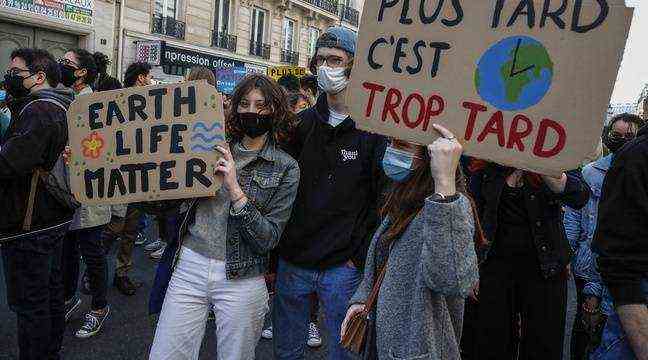A demonstration against climate change in Paris on March 28. – Michel Euler / AP / SIPA
- Christophe Castaner, Emmanuelle Wargon, and even Bruno Le Maire. The government and the majority have welcomed the conclusions of an MIT publication, which ranks France as the fourth “greenest” country in the world.
- The methodology of the report, however, questions. 40% of each country’s final score is based on predictions.
- This report was also sponsored.
“Yes, our environmental policy is ambitious. “” We can act concretely, rather than shattering dreams. »Bruno Le Maire, Minister of the Economy and Finance, and Christophe Castaner, head of the LREM group at the Assembly,
joined by several deputies of the majority,
do not have lacked praise for the government’s climate policy.
The source of their satisfaction? A report which ranks France “the fourth greenest country in the world”. A welcome ranking for the executive, which has faced criticism from the opposition and specialists on its climate bill. However, several scientists have pointed to several flaws in this publication. Olivier Fontan, executive director of the High Council for the Climate, has him
also underlined breaches.
FAKE OFF
The report, originally published by the MIT Technology Review January 25,
establishes a “green index of the future” (“Green Future Index”). The index ranks 76 countries “based on their progress and commitment to a low-carbon future.”
Scientists wonder as well on the methodology of the report, which was sponsored by three companies each benefiting from a full page of advertising in this document of about thirty pages. In particular, 40% of the score is calculated from the policies undertaken by the country and its intentions to fight against climate change. Promises that can be delayed or even canceled, for example in favor of a political alternation.
If France is ranked fourth greenest country in the world, it is because it is tied for second with Denmark on this issue of future commitments. The authors underline French support for hydrogen, as well as a government support plan for Air France “accompanied by ecological conditions, such as
the introduction of sustainable fuel and the reduction of
internal links ”.
A methodology that questions
On the other hand, France scores lower on the other four pillars of this report, which make up the remaining 60% of the score. These axes are carbon emissions, energy transition, a “green society” and “clean innovation”.
For carbon emissions, France comes 13th. Although our country appears to be well ranked, the methodology adopted by the authors of the report contains an important omission. “We are talking about emissions only from the point of view of production and not of consumption”, detailed researcher Frédéric Ghersi at the Huffington Post. This means that the calculation does not take into account the emissions of products that France imports. Reducing carbon emissions is one of the major points of the Paris agreement to reduce climate change.
In the report, our country ranks ninth for “clean innovation”, a ranking that takes into account patents in the green sector, cross-border investments in clean energy and “foodtech” startups, these companies specializing in new technologies and food.
On the other hand, for the energy transition and the “green society”, France arrives in 62nd and 57th places out of 76. In the “green society”, the authors include green buildings, recycling, consumption of meat and dairy products. and the evolution of afforestation.
Overall, eight of the top ten countries in the ranking are European, and seven of them are part of the EU. The authors of the report stress that the EU “has put in place climate policies for more than ten years”, which explains, in part, the good score of his members.

